Resurfacing Dining Room Table
Today I'm sharing everything you need to know to refinish your old, run down wood table and make it beautiful again. Learn how to refinish a table including how to strip away the old finish, paint the legs, restain the top, and protect the finish so that it will last for years to come.
If you saw my table from a distance, you'd think I was crazy for calling it worn out. It is an absolutely beautiful table with gorgeous wood grain and beautiful details. Up close things aren't quite as pretty though.
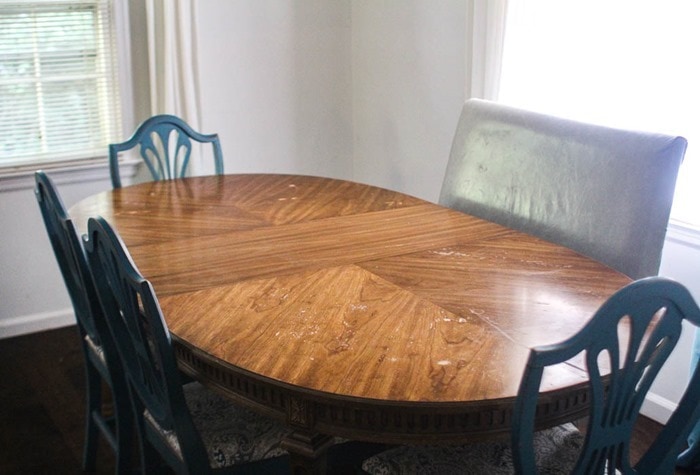
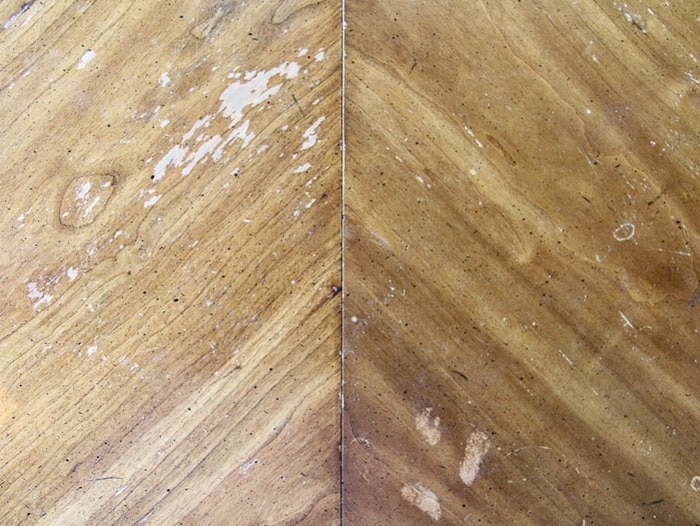
The top was absolutely covered with scratches and huge scuffs where the finish was completely gone. And the legs and apron were also covered in nicks and dings.
This was definitely not how this beautiful table was meant to look.
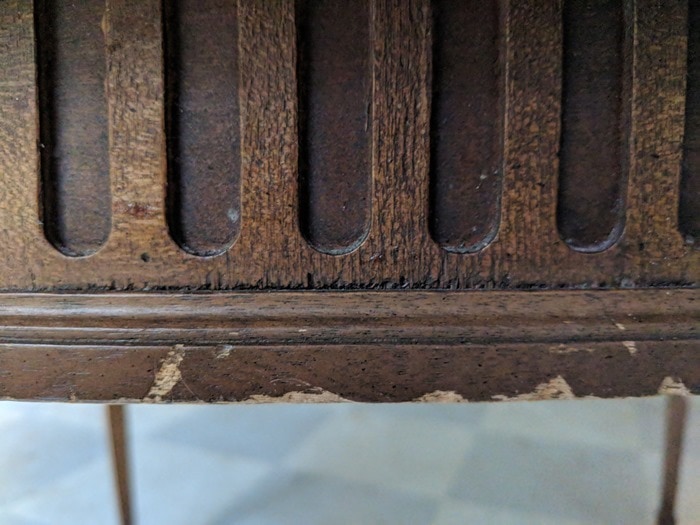
I found this table a little over a year ago on Facebook Marketplace and it was an absolute steal. I scored the table with two leaves and six matching chairs for only $50!
I was six months pregnant at the time so I knew it wouldn't be refinishing the set anytime soon. So we set them up in our dining room, scuffs and all and called it good.
Well, here we are more than a year later and I decided it was finally time to refinish the table.
(The matching chairs need a bit more repair so they are hanging out in our basement for now until I get around to dealing with them. Luckily my blue chairs also look great with the table.)
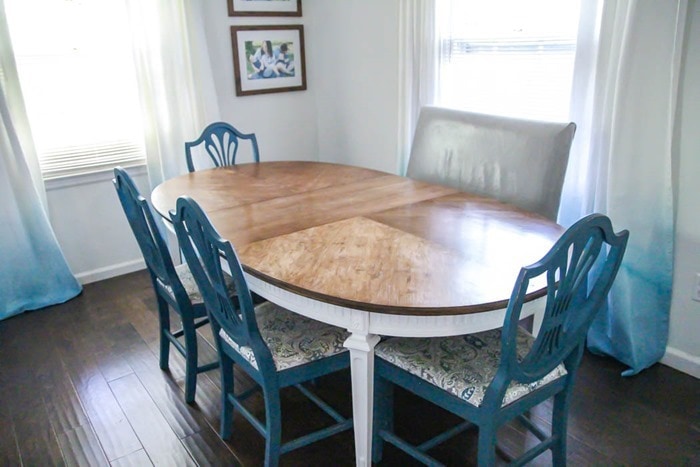
Nobody would call this table run down now! Just look at that gorgeous wood grain.
I love painting furniture, but there is just something about restoring a beautiful piece of wood furniture that is almost magical.
This post contains affiliate links which means if you make a purchase after clicking a link I will earn a small commission but it won't cost you a penny more. Click here to see my full disclosure policy
Materials Used to Refinish Table
For stripping the old finish
- KleanStrip Stripper
- KleanStrip Paint Stripper After Wash
- chip brush
- metal container – an old metal bowl or pan works well for this
- stripping brush
- plastic paint scraper
- stripping pads
- clean rags
- gloves
- sanding block and extra sandpaper, 220 and 400 grit
For painting the legs
- Zinsser Bullseye Clear Shellac
- General Finishes Snow White Milk Paint (one of my favorite furniture paints)
- paintbrush – these are some of my favorites for painting furniture
- HomeRight Finish Max Sprayer – you definitely do NOT have to have a paint sprayer to paint furniture, but it does make the job go much faster!
- Large Homeright spray shelter – this is completely optional, but if you are painting furniture with a paint sprayer, this spray shelter is a great way to protect the area where you are working from overspray.
For staining the table top
- Minwax prestain wood conditioner
- Minwax Provincial stain
- clean rags
- Minwax Fast Drying Polyurethane, Satin
- foam brush
- 400 grit sandpaper
How to Refinish a Table
Stripping the Old Finish
The first step is stripping away the old finish from the table top. This is probably the most intimidating part of the whole process, but it truly isn't difficult, just messy and a bit tedious.
There are two main methods of removing paint or stain from wood furniture: sanding and using a chemical stripper.
I've used both methods, but in most cases I prefer using a stripper. Sanding can be time-intensive and it is very easy to unintentionally sand marks into the wood or sand right through wood veneer.
Using a stripper requires more steps (including a bit of sanding at the end), but it leaves a perfectly smooth wood surface in the end. I used KleanStrip Stripper .
There are other strippers available that use slightly less harsh chemicals and are more environmentally friendly but they tend to take much longer to work.
I chose to use KleanStrip because it works really well and really fast. Since it is full of pretty strong chemicals, it is important to take all appropriate safety precautions. It is best to work outside and be sure that you wear gloves to protect your skin.
Pour some stripper into a metal container and use a cheap chip brush to brush a layer of stripper onto your table top. My table is pretty large, so I worked in smaller sections.
This stuff works very quickly; I was able to see the finish immediately begin to separate from the wood.
Wait around ten minutes and then you can test a small area to see if it is ready to scrape.
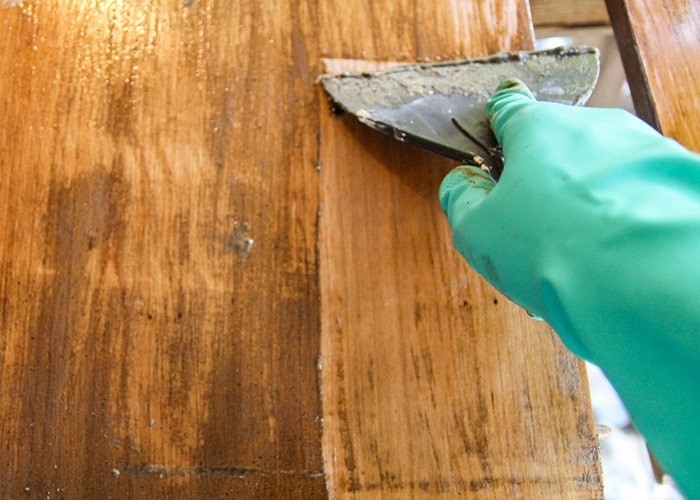
Use a plastic paint scraper to scrape away the old finish. This part is very messy. It helps to have paper towels nearby just in case and also to have an old box to scrape the mess into.
If the finish feels sticky or resists as you scrape, it isn't ready yet. You should be able to scrape it away without much effort.
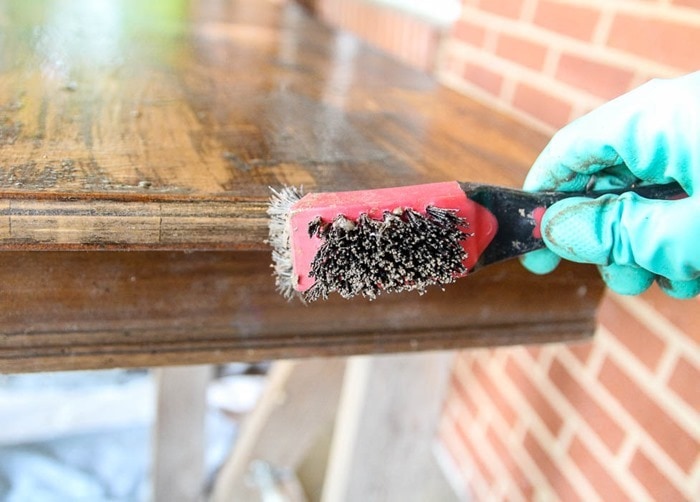
Use a wire brush to scrape away the finish from the table edge.
Once you have scraped away the finish, the table will probably still look pretty messy. If there is a lot of thick varnish left, you may need to repeat the stripping process.
Otherwise, you can skip straight to applying the KleanStrip Paint Stripper After Wash . This really helps clear away the rest of the finish and most of the stain as well. Use a stripping pad to apply After Wash to a small section, scrubbing it into the wood in small circles.
Then use a second stripping pad dampened with water, to help rinse away the remaining residue. Finally use a rag to wipe away any remaining water and gunk.
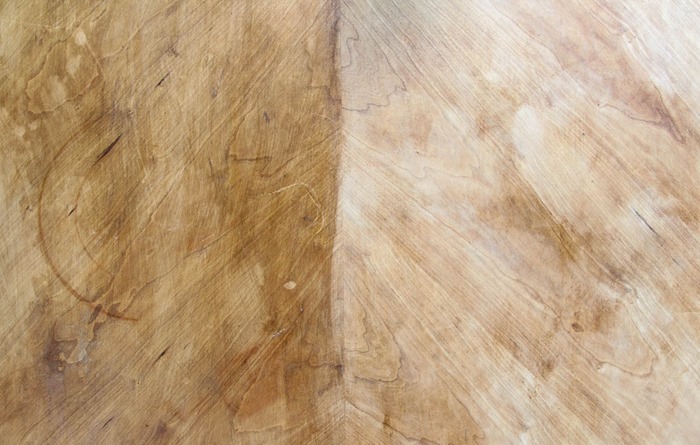
Look what a huge difference the After Wash makes. The section to the left hasn't received any After Wash yet, while the section to the right has.
Once the table has fully dried, you can use sandpaper to remove those last stubborn bits of stain and ensure the finish is nice and even. You want to use extra fine sandpaper and be sure to sand in the same direction as the wood grain.
And yes, it is best to sand by hand at this point, rather than with a power sander.
I started by sanding my tabletop with a 220 grit sanding block, followed by 400 grit. This really helped remove the last little traces of stain and leave a perfectly smooth, even surface ready for new stain.
After sanding remove all of the sawdust from the tabletop using a soft cloth.
Painting the Table Legs
I chose to paint the legs of the table rather than restaining them for a couple of reasons. I did not want to take on the task of stripping the stain from all of the nooks and crannies on this table and luckily, I really love the look of a table with white legs and a wood top.
Even though painting is simpler than restaining, there are still some important steps to follow. The first step to painting a piece of furniture is always cleaning. It's important to clean away greasy residue, crumbs, and dust to leave a clean surface that paint will stick to.
After cleaning, I used painter's tape and some extra thick wrapping paper to cover the freshly stripped tabletop to protect it during painting.
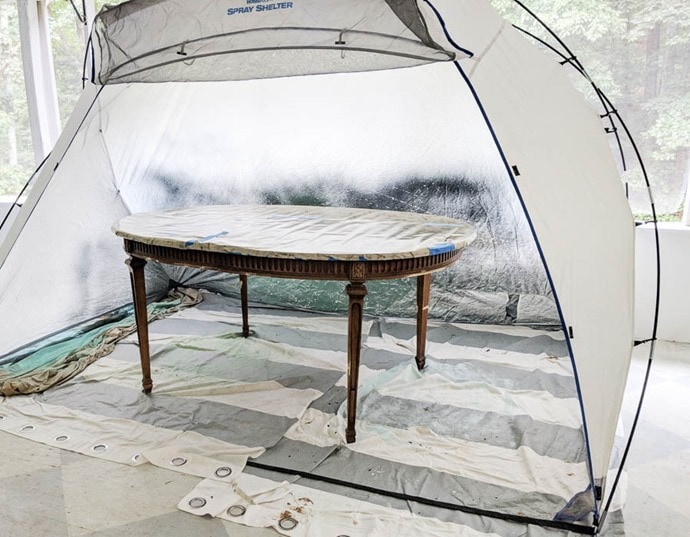
When painting furniture white, I always start with a good sealer or primer to prevent wood tannins from bleeding through the paint and yellowing the finish.
In this case, I used spray on Zinsser Bullseye Clear Shellac . Since it comes in spray paint form, it was really fast to apply to the turns and details of my table apron and legs.
I applied two coats of sealer and once it was dry used General Finishes Milk Paint in Snow White .
I applied two coats of paint using my HomeRight Super Finish Max Paint Sprayer.
Of course, you can also use a paintbrush to apply your paint; it will just take more time. I did use a paintbrush to help fill in some spots that the sprayer didn't do a great job of hitting.
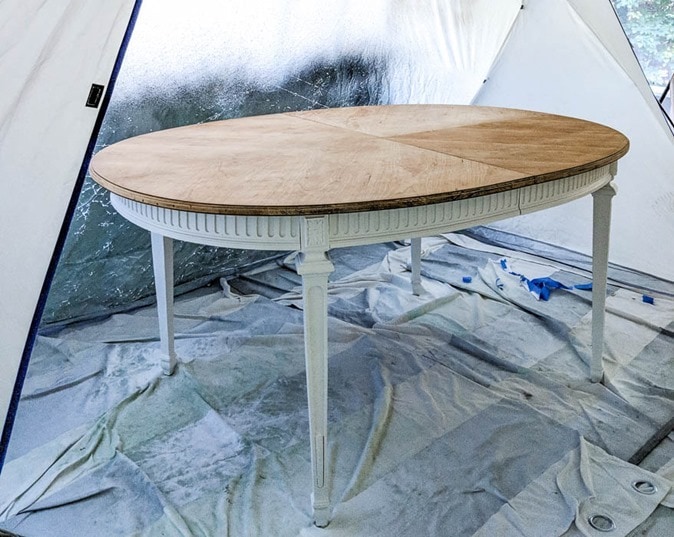
Want more details?
I have an entire post dedicated to painting furniture white including what products to use and how to make sure you prevent bleed-through.
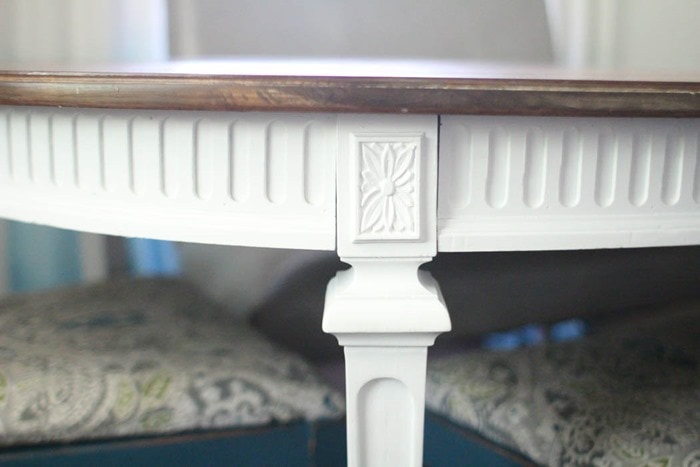
Staining the Tabletop
Once I saw how beautiful my naked tabletop was, I strongly considered skipping the stain and leaving the wood its natural color. But I decided to go classic with a medium stain instead.
I chose Minwax Provincial Stain . It has a beautiful color that isn't too yellow and is light enough it won't hide the beautiful wood grain.
Before staining, I used a clean rag to apply Minwax pre-stain conditioner.
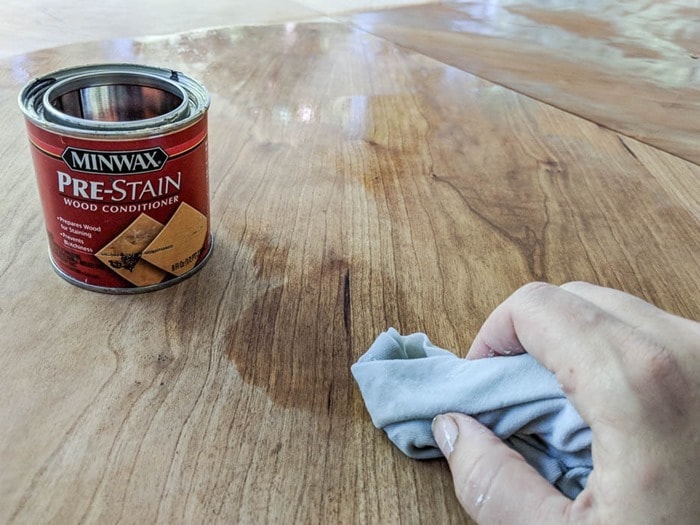
This helps prepare the wood so that the stain goes on more evenly. Wipe off any excess wood conditioner and allow it to dry for around 15 minutes.
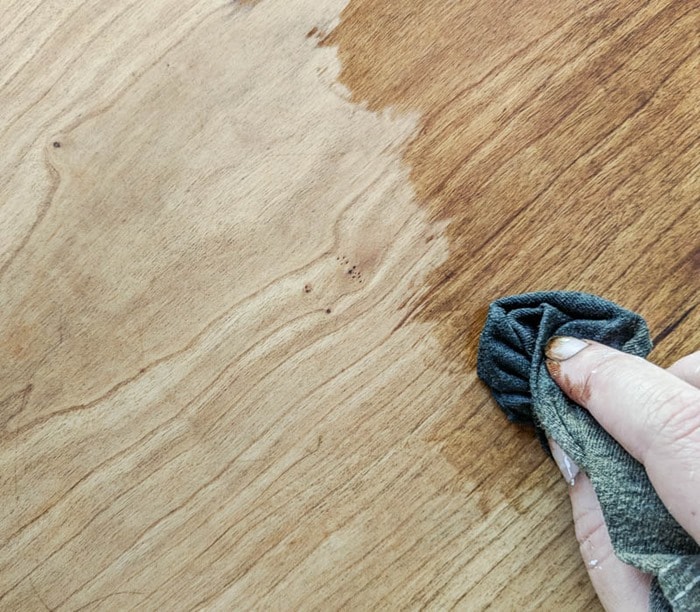
Then use a clean rag to apply the stain. Wipe it on in long, even strokes and be sure to keep a wet edge.
Wipe off any excess stain and allow the stain to fully dry following all instructions on the can of stain. If you want the color to be a bit deeper, you can apply a second coat of stain after 4-6 hours.
Allow the stain to fully dry before applying a sealer. Eight hours is the recommended minimum amount of time and will probably feel like far too long. Just be patient. We definitely don't want to screw things up at this point!
Sealing the Tabletop
When refinishing a table, it is very important to seal your finish well. Tabletops take lots of abuse and nobody wants to have to refinish their table again after only a few months of use.
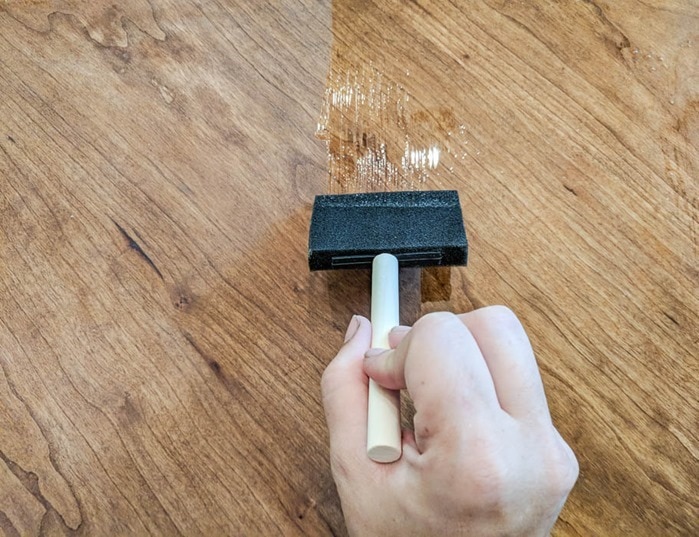
I used Minwax Fast Drying Polyurethane to finish my tabletop, but to be honest, this is not my favorite product to work with. I find it very difficult to apply smoothly without brushmarks, even when using a foam brush to apply.
(Confused about top coats and which ones are best for refinished furniture? I have to-the-point reviews of all of the best and worst furniture sealers right here.)
I applied three coats to this tabletop using a foam brush, sanding with 400 grit sandpaper between coats to help smooth out the brushmarks.
I much prefer General Finishes High Performance Top Coat. It is more forgiving and easier to apply and works well over both stain and paint.
The Refinished Table
Check out this beauty now!
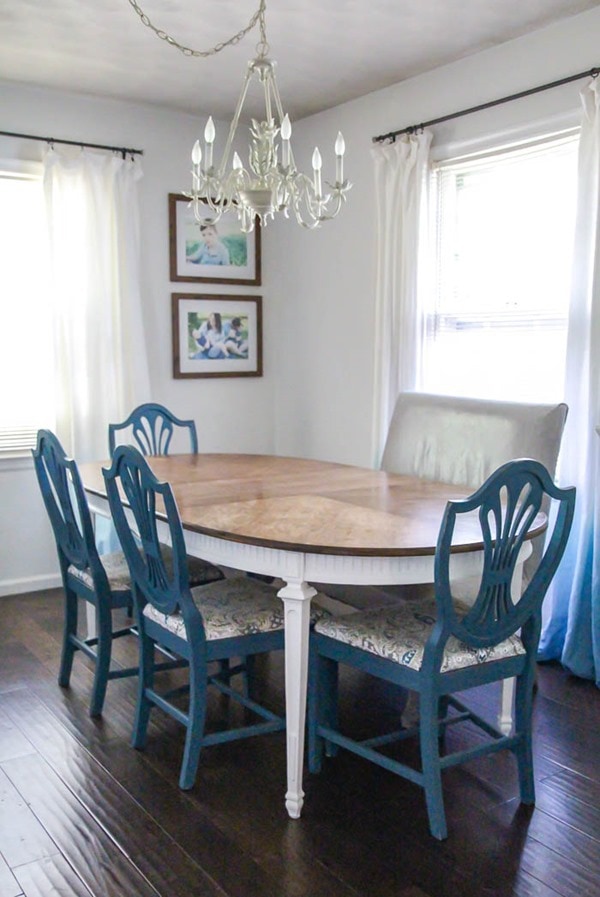
Now that is one beautiful table!
In some of the photos, it looks like one section of the table is a different color from the rest. In reality, everything is the same. Because of the angled wood grain, the various sections catch the light differently and may appear to be different colors.
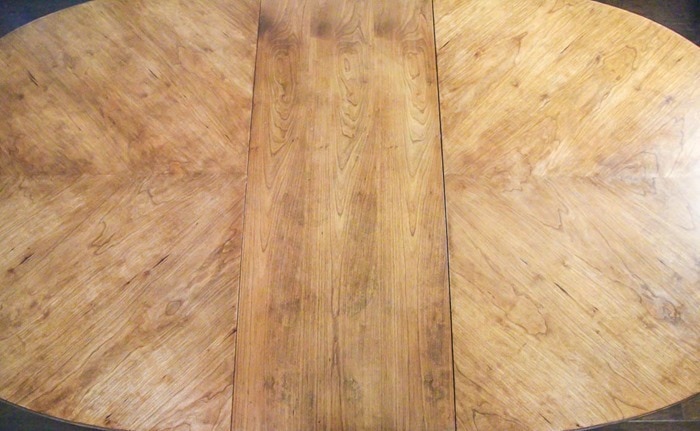
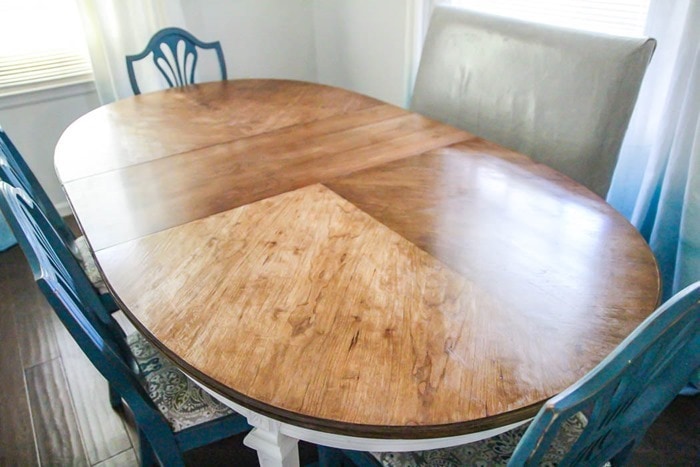
Here are links to the other DIY projects you see in this room in case you missed them:
- Dining Chair Transformation
- How to Reupholster Furniture with Gorgeous Leather
- DIY Ombre Curtains
Ready to see some more fabulous furniture flips from the rest of the Furniture Flippers? These are the before pictures. Just click the links to see how they turned out.
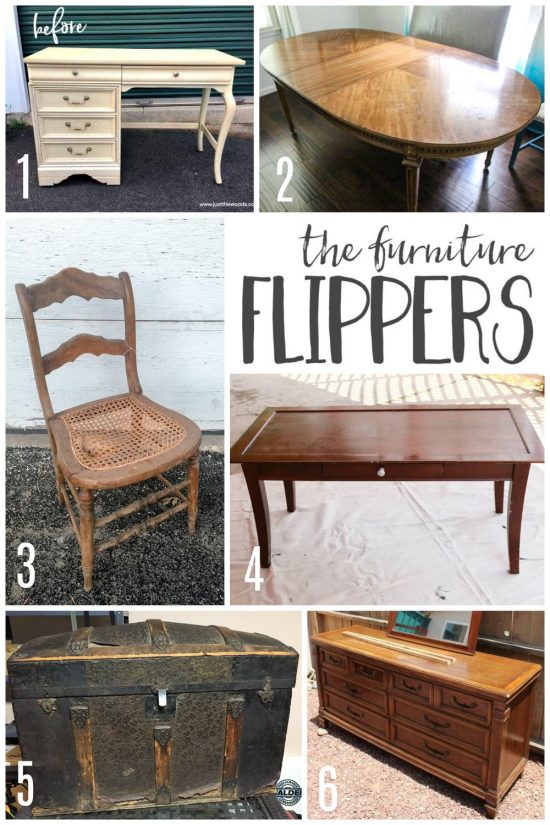
- How to Create Fabulous Painted Furniture with Cutting Edge Stencils by Just the Woods
- How to Refinish a Worn Out Dining Table by Lovely Etc.
- How to Fix a Chair with a Broken Seat by Refresh Living
- The Coffee Table Flip That Did Not Go As Planned by A Fresh-Squeezed Life
- Restoring an Antique Steamer Trunk by Repurpose and Upcycle
- The Best Way to Get Cheap Rustic Furniture by Thirty-Eighth Street
I'd love for you to share this post on Pinterest!

Materials
- KleanStrip Stripper
- KleanStrip Paint Stripper After Wash
- Stripping pads
- Clean rags
- Gloves
- Zinsser Bullseye Clear Shellac
- General Finishes Snow White Milk Paint
- Minwax prestain wood conditioner
- Minwax Provincial stain
- Minwax fast-drying polyurethane, satin
Tools
- Chip brush
- metal container
- stripping brush
- Plastic paint scraper
- Sanding block and extra sandpaper, 220 and 400 grit
- HomeRight Finish Max Sprayer
- Large Homeright spray shelter
- paintbrush
- foam brush
Instructions
- Use KleanStrip Stripper to remove the old finish with a chip brush.
- Use a plastic paint scraper to scrape away the old finish.
- A wire brush is needed to scrape away the finish from the table edge.
- Apply the KleanStrip Paint Stripper After Wash to a small section. Scrub it into the wood in small circles.
- Use a second damp stripping pad to rinse away any remaining residue.
- Wipe away any remaining water and gunk with a clean rag.
- Once the table is fully dry, use sandpaper to remove any remaining stain.
- Remove the sawdust from the tabletop using a soft cloth.
- Clean the table legs to remove any greasy residue, crumbs, and dust.
- Use painter's tape and thick wrapping paper to cover the tabletop.
- Apply two coats of the shellac or an oil-based primer.
- Once dry, apply two coats of paint using either a paintbrush or the HomeRight Super Finish Max Paint Sprayer. Allow the paint to dry.
- Use a clean rag to apply Minwax pre-stain conditioner to the table top.
- Wipe off any excess conditioner and allow to dry for around 15 minutes.
- Apply the stain of your choice with a clean rag.
- Wipe off any excess stain and allow the stain to fully dry before applying a sealer.
- Apply three coats of polyurethane using a foam brush.
- Sand with 400 grit sandpaper between coats to smooth out the brush marks.
Google Web Story: How to Refinish a Dining Room Table
Source: https://www.lovelyetc.com/refinish-dining-room-table/


0 Komentar